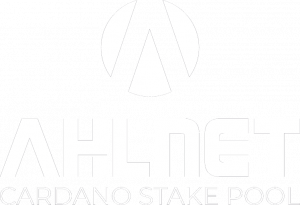

AHLNET is a stake pool for the Cardano community that lets you earn passive income
for the ADA you hold while strengthening the network
Core developer of the popular Cardano light wallet Eternl.
Voted in by the Community as an official stake pool for the SundaeSwap Scooper.
AHL is part of the DripDropz Droperator program earning you additional buffs when claiming token rewards.
To get the latest information, pool statistics and be able to ask questions please join my Telegram group.
See Contact section for all possible ways to follow the progress of AHLNET st₳ke pool.

To help spread the word of Cardano and what it is trying to accomplish.
By running a stake pool I can help strengthen the network and make it as decentralized as possible. By delegating your ADA you can also help grow the ecosystem and at the same time earn rewards for it. Delegating can be compared to bitcoin mining in some way but without the wasteful power usage that a proof-of-work system like bitcoin requires. A proof-of-stake system like Cardano eliminates this issue without compromising on security.
Getting your ADA delegated is as easy as a click of a button in the popular Cardano wallets like eternl.io, Daedalus, and Yoroi.
See Guide section on this page for how to delegate your ADA.
For more information on Cardano and their goals see the Cardano Foundation website at cardanofoundation.org
Community Explorers
Pool.pm
Cardanoscan.io
PoolTool.io
ADApools.org
Telegram Bots
Cardanoscan.io Bot
PoolTool Bot
Adapools Bot
Open your web browser and navigate to eternl.io
Create or restore a wallet and send your funds to it to delegate.
Choose Staking (1) in the wallet menu.
Type in AHL or AHLNET in the search box and my pool tile should show.
Click on “Delegate” button (2) and follow the instructions to complete the delegation.
DONE!